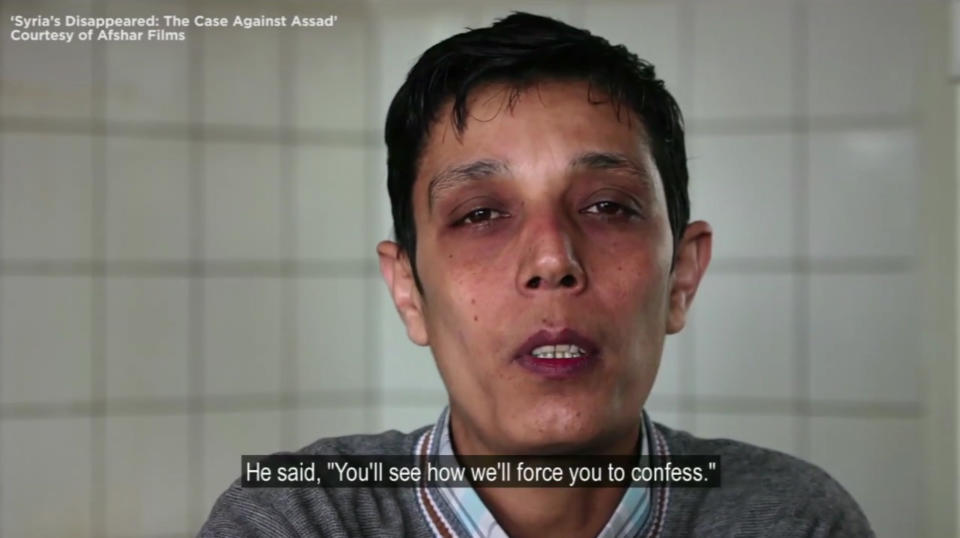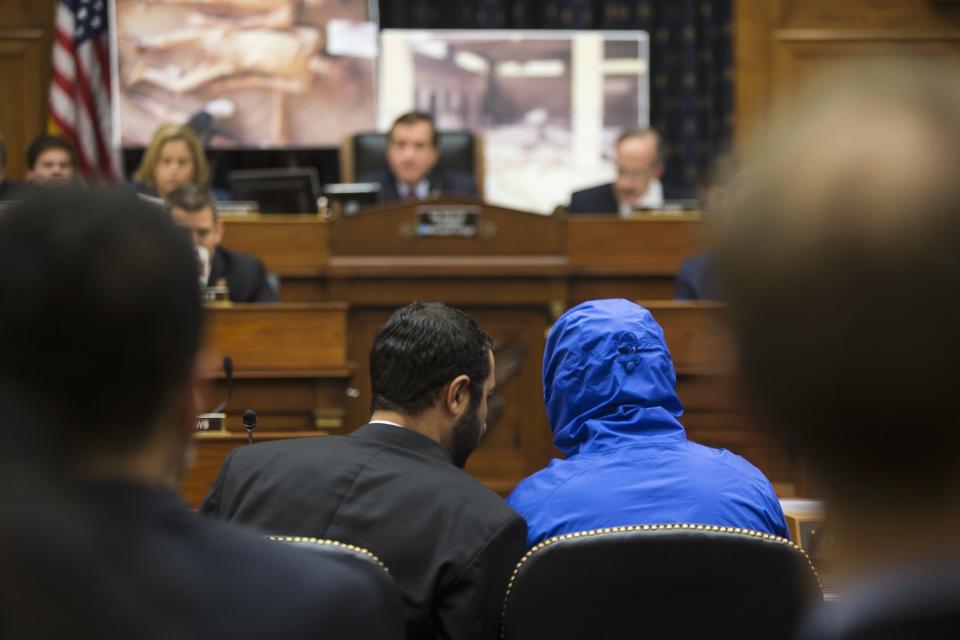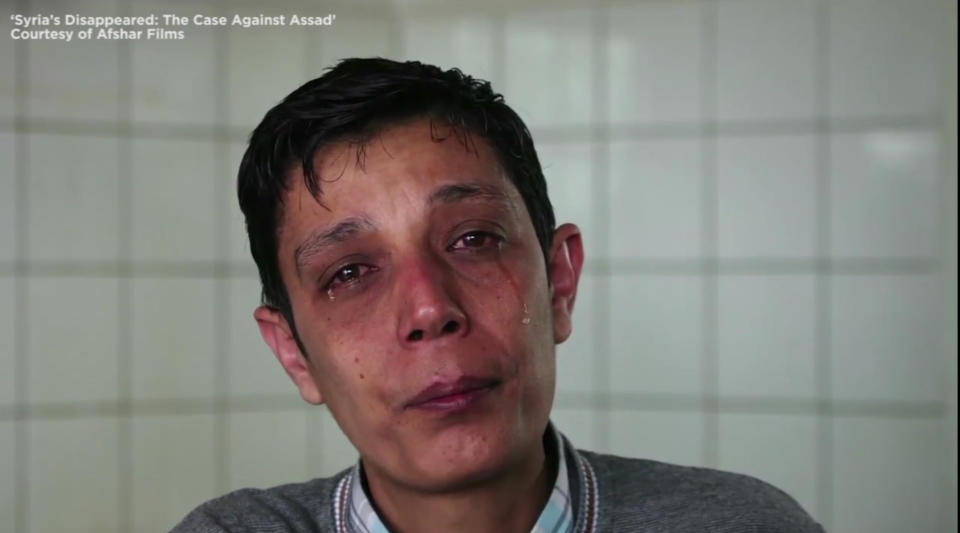Assad’s victims given voice in haunting new film
The Syrian military interrogator’s threat was blunt and chilling.
“You’ll see how we’ll force you to confess,” the interrogator told Mazen Alhummada, a human rights activist, after he was arrested while sipping tea at a café in March 2012 and taken to one of President Bashar Assad’s most notorious prisons, the detention facility at Messe Military Airport outside of Damascus.
In a powerful new film, “Syria’s Disappeared: The Case against Assad,” Alhummada describes in stomach-turning detail what happened next.
“They brought a clamp and it has a handle that he’d put around the penis,” Alhummada says. “Of course, after stripping you of underwear and you remain naked as God created you. And he put the clamp and started tightening and tightening and tightening, squeezing your penis until you feel like he’s going to cut [it] off. … And a man from behind puts a pole up your anus and is hitting you like this. … The human brain can’t imagine it.”

Unimaginable, but as “Syria’s Disappeared” argues, all too real under the Assad regime. The film, the work of former BBC producers Sara Afshar and Nicola Cutcher, methodically documents the brutality of the Assad government, its crackdown on democratic protests during the Arab Spring of 2011 and its jailing of activists like Alhummada. It includes gripping firsthand testimony from some of the victims about what happened to them, and haunting images — some never seen before — by a former regime photographer, code-named “Caesar,” who worked inside Syrian government prisons.
“These are torture chambers — full stop,” says Stephen Rapp, President Obama’s former ambassador for global criminal justice and war crimes, who is prominently featured in the film. “When I finally gained access to the images, in April 2014, and sat at the computer and went through them one after another … it’s like pictures of hell. The most excruciating, painful sort of things you can imagine … eyes gouged. You also see pain on the face, the frozen images of the last moments of life.”
The photographs, which show rows of emaciated, brutally beaten bodies, have been compared to images from Nazi concentration camps, and have been displayed at the Holocaust Museum in Washington. And they are what moved Afshar and Cutcher to make the film.
When she first saw the photographs, “I was really shocked,” Afshar, the director, said in an interview with Yahoo News. “I thought they would make a huge impact in terms of people talking about this evidence of mass atrocities.”

But the timing wasn’t right. In 2014 it was the rise of ISIS that dominated world attention. The photographer, Caesar, who defected from the regime and smuggled the photographs out, testified before a House committee (wearing a hood), expecting the photos would shock the world’s conscience and mobilize the international community to bring Assad’s government to justice.
But nothing happened. Obama, who had rejected proposals to arm moderate Syrian rebels and stepped back from retaliating against Assad over a chemical weapons attack the year before, focused his attention elsewhere, ordering U.S. airstrikes against ISIS in Iraq.
Rapp, for his part, remains disappointed that the president he served did not do more to step up the pressure on Assad when it might have made a difference. “I believe we should have done more militarily to make Assad pay a price for these crimes,” Rapp said in the interview with Yahoo News. “I wish we would have been more robust, and I was disappointed, frankly, by that.”
But Rapp said he is proud that his office at the State Department did begin the process of documenting the Syrian regime’s abuses, including arranging for the FBI to examine and authenticate the Caesar photos. The bureau concluded in a report that the photos showed no signs of manipulation and appeared to depict real events.
The FBI conclusion would appear to refute the Syrian government’s claim that the photos were doctored, but it didn’t faze Assad. The film includes an excerpt from this reporter’s interview with Assad for Yahoo News in February, when he was confronted with copies of the photos and the FBI report. “It’s just propaganda, it’s just fake news, they want to demonize the Syrian government,” Assad said. “In every war, you can have any individual crime. It happened here, all over the world, anywhere, but it’s not a policy.”
But Rapp, who has prosecuted war crimes in Rwanda and Sierra Leone, has a different take. He is now working with Spanish lawyers and a German prosecutor to bring court cases, based on the Caesar photos and the testimony of witnesses like Alhummada, charging senior Syrian officials with war crimes and human rights abuses. And while getting those officials into foreign courts is a challenge, he is convinced that the evidence is overwhelming — as strong, he says, as he has ever seen.
“You’ve got facilities there that are part of the regime, under the control of the president,” he says in the film. “So they can’t say, ‘Oh, it was a bunch of crazy thugs that were doing it and we were against that, we wanted people treated humanely, but boys will be boys, we just didn’t know.’ Well, now they know, and they’re not doing anything about it, not punishing a single soul!
“So you then have a case under international law of so-called command responsibility that makes commanders responsible if they know and they don’t do anything. You don’t even need to prove they gave an order. It’s enough! So this makes this, you know, the legal equivalent of a slam-dunk.”
But whether Rapp and his colleagues will ever be able to successfully bring such a case is far from clear — at least as long as Assad remains in power. Even assuming international arrest warrants are ever issued, no Syrian official responsible for the regime’s crimes is likely to leave Syria, he acknowledges. And Russia, Assad’s chief ally, has vetoed a Security Council resolution to refer the Syria case to the International Criminal Court.

But Afshar and Cutcher hope their film will stir the international community into action. Afshar was mildly encouraged when President Trump responded to Assad’s more recent use of chemical weapons with a Tomahawk missile strike — a step Obama never took.
“I’d really like President Trump to watch the film — and to see the Caesar photos and to hear the testimonies of [Alhummada and others depicted in the film]. … It should be heard by everybody at the highest levels in America and all around the world. … This is happening on all our watches. We all have to take responsibility and then decide what we need to do as individuals to stop these atrocities.”
There will be a screening of “Syria’s Disappeared” at the United Nations Association in New York on Tuesday, May 16, UNA-NY: Events.
_____
Read more from Yahoo News:



